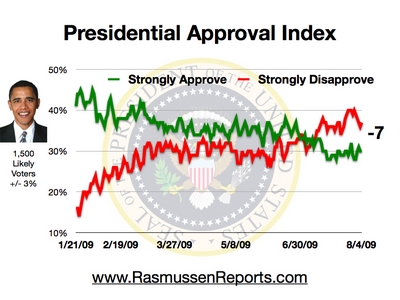
It's down a point since yesterday! Obama is trending down! By 2010, he will lose to Sarah Palin, zero to 100!
I'm a little bugged by this particular poll, and finally someone has articulated what's wrong with it (and right with it) better than I. Eric Kleefield at TPMDC looks closer.
...The thing to remember is that this is not simply subtracting all the respondents who disapprove of President Obama from the people who approve. Instead, Rasmussen takes the numbers who strongly approve or disapprove, and then performs this math. As of today, that index number is -10, compared to an overall rating of +1 in Rasmussen's daily tracker.I'm mostly struck by that George Bush number - he was running a negative one when he was reelected. This chart is essentially a poll of extremists. It's like asking gourmets what the most popular dinner is - you'll reach a conclusion that it's escargot, and yet hamburger sales figures will say otherwise.
It would seem at first glance that this number can skew negative -- that is, the people who disapprove of a president are inherently more likely to feel strongly about it, compared to a certain level of lukewarm support for a president. For example, the 2004 exit poll put George W. Bush's strong approval at 33%, to strong disapproval of 34%. But his overall approval was 53% to disapproval at 46%, and he was re-elected 51%-48%.
I asked three prominent polling experts about this, and they all lambasted it.
...Rasmussen has a working hypothesis that these numbers could be an important indicator in the lower-turnout midterm elections of 2010, when intensity of feeling can genuinely matter. "I know the intensity by the time we get to 2012 won't matter as much as the overall number. What I don't know, and what we're unsure of, is what it does in 2010," said Rasmussen. "Clearly, if the President's numbers are down from where they are now, whether you mean overall or the index, it's going to be more difficult for Democrats to do well in the midterms. And I don't know, but I suspect, that if the intensity gap is strong it will hurt them. It definitely hurt the Republicans in 2006."
For now, Rasmussen said the usefulness of the strong approval-disapproval index could become more apparent over the coming recess. Members of Congress will go home and hear a lot from constituents who are heavily in favor of Obama's proposals, or heavily against them. "They're probably not gonna hear from people in August who are kind of lukewarm," he said. "Now I'm not saying whether that's a healthy dynamic, but I'm saying people who are more passionate get heard more."
On the other hand, if our representatives don't read more conventional polls, they will indeed reach the conclusions that Rasmussen does. However, most polls ARE conventional. So we shall see.
I don't put much stock in polls. I have written about them from time to time, but usually I ignore them even when they support my side.
ReplyDeleteI'm inclined to agree with you on that one, with the exception that if someone is arguing that a poll means my side is losing, I'll throw polls back at them. But ultimately they're more amusing than meaningful.
ReplyDeleteYep. We are on track with this one, for sure. You know what they say: figures don't lie but liars figure.
ReplyDeleteYou keep spinning that a growing strong disapproval and a shrinking strong approval is a good thing and doesn't matter , hahahaha
ReplyDeleteDon't like this poll, why not look at any other , yo.
Overall approval/disapproval has been sinking like a rock in any poll u'd like to look at.
Keepin it realer, yo